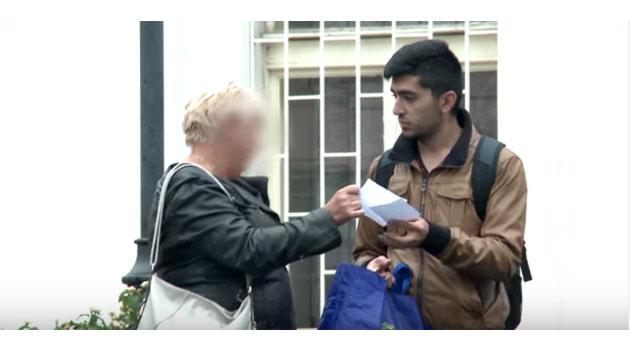Czech Republic: Hidden camera captures reactions to a refugee family from Syria

The organizers of the Czech Government project "HateFree Culture" decided to test the approach taken by people in the Czech Republic toward refugees when they meet them face to face. The project sent a Syrian family with a young child to Kolín and to several neighboring villages in Central Bohemia.
Using a hidden camera, they filmed the reaction of local residents to the family – and most of them were positive. Project coordinator Lukáš Houdek informed the Czech News Agency of the results on Monday.
The experiment took place three weeks ago. "What we believed to be the case has been confirmed. When people are presented with refugees face to face, they help them and behave in a spirit of solidarity. From the commentaries posted online it seems that this country is xenophobic, but we aren’t that bad. This is mostly about fear, which dissipates during a personal encounter," Houdek said.
The organizer also said the protagonists of the hidden camera experiment were pleasantly surprised by people’s reactions to them. Navdar Muhamed, a Syrian who has been living in the Czech Republic for 10 years, was involved in the experiment.
His family decided to leave their homeland after civil unrest broke out there more than a decade ago. He is now studying international relations at the university in Plzeň, specializing in the Middle East.
In the future he would like to work for the Czech diplomatic service. He was accompanied by a young Muslim woman wearing a headscarf and holding a small child in her arms during the experiment.
One woman they encountered told them they should go to Germany because life in the Czech Republic is not very good. She also warned the young family to expect racism here.
One mother with young children advised Navdar to go to a big city because there is no work in the countryside. Another woman gave the headscarf-wearing migrant lady CZK 1 000 (EUR 37) and a grocer gave the family a gift of fruit.
Some tried to calm the refugees and told them not to be afraid. Others called the local Vice-Mayor for aid so the family would not remain on the street with their young child.
"You can spend the night in my apartment. I won’t be home from work until 9 PM, but we can talk about your future then," one older man offered the refugees and eventually brought them home with him.
Some people did not understand what the refugees were asking them, while others were in too much of a hurry to interact. "Go home," one passer-by said to them crossly.
Houdek said the testers apparently did not encounter any worse reactions than that during the experiment. According to a survey conducted by the Center for Public Opinion Research, half of the people in the Czech Republic are against receiving refugees from countries at war.
Two-fifths would be in favor of providing a temporary safe harbor to such foreign nationals until such time as they are able to return to their native countries. Only every 25th adult respondent said refugees could settle in the Czech Republic.
Several demonstrations against migration have been held in Prague and other locations around the country. Those who want to express their solidarity with refugees and who are bothered by xenophobia have also assembled in city centers.
The HateFree Culture project is part of the Czech Government’s efforts against hatred in society. People from the Czech Government Agency for Social Inclusion are contributing to the project.
VIDEO